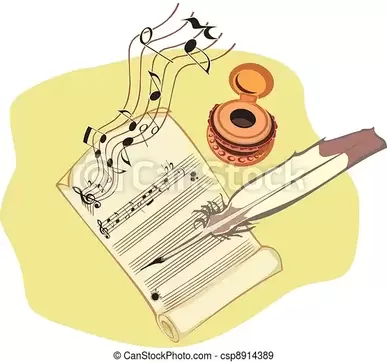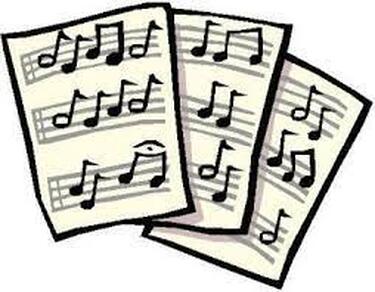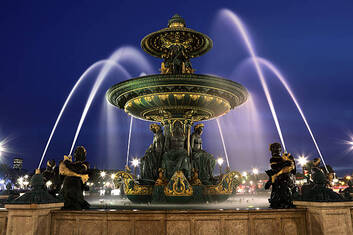 I’ve been thinking about my writing prosses a lot lately. I’m coming off a long stint of writers’ block. When I have these periods of writers’ block, I start thinking about how I can improve my writing process and I’m in the process of doing this. So, I may ramble some. Please forgive me. I’m going to break this down into two parts. The way that I work on children’s pieces greatly differs from how I work on more mature works. When I begin working on children’s work the first thing that I think about is the techniques that I want my player to learn and practice. For example, maybe I want my performer to learn about rolling chords (arpeggios). This will be the focus of the piece so the piece that I develop will stem from this idea rather than from the musical themes themselves. Once I have the main technique decided and a couple of themes written using the technique, I begin looking for other techniques that are similar or that will complement the primary technique. This will end up being a secondary theme or a development of the main theme that I can use to help spice up the piece. For the most part my children’s pieces follow standard structures such as 4 bar question and answer phrases, 8 – 16 bar sections, etc. Because of children limited technical abilities pedagogical pieces tend to be highly structured and highly limited in scope. One of the reasons I love writing beginning pieces is because it limits a lot of decision making. This box that pedagogy pieces put you in helps me to be more creative be I have to try to make the piece interesting and still focus on the primary objective of the piece.  Writing more mature works is a different story and seems to be something that I struggle with from time to time. I have discovered if I have a premise or a title to work from that it makes writing much easier. For example, a couple of years ago I wrote my piece Ancient Alchemy. I knew that I wanted the piece to focus around the four elements and because I had that starting point the work seemed to fly by. My first step after getting the thesis, I started writing themes that reflected each of the elements and finding techniques that would help color these ideas. The next step was laying out the ideas that made a logical progression in my mind, followed by connecting these ideas together. The next step for me is where the real heart of composition lies, that’s in editing. At this point I have put together an audio file (usually MIDI) so that I can listen to the piece over and over again. During this editing process I make adjustments to things, change layouts, add dynamics and articulations, and begin to slowly build the piece into something that I like and am happy with. This process takes lots of time an effort. There are times when I hear things that I absolutely hate, but am not sure how to correct it. This is when I go back to the beginning of the process and begin again with just that small little piece of music. I am always looking for new and more efficient ways to compose, looking for new ideas to improve my writing process. One of the things that I often turn to is articles on writing stories and novels. Surprisingly there are a lot of similarities between writing a book and writing a piece of music. Somethings that I have looked at and/or learned are about structure, form, keeping on track, etc. Even participate in NaNoWriMo, except I work on music instead of a novel. (NaNoWriMo is National Novel Writing Month. It’s an annual event that generally happens in November and it is used to help novice writers to complete lengthy projects. It started in 1999 as a challenge to write 50,000 words within a month. It’s a great program. I’ll post a link to the website below.) This is just a little glimpse into my composing world and what I do. If you have any writing tips, I would love to hear them. I’m always looking for new perspectives and new ways to make my writing process better.
0 Comments
As a music lover, musician, and composer there are certain pieces/songs that I always return to. Pieces for when I’m sad, happy, or just excited about life. I know we all have those songs that we add to our favorites lists. This is going to be a starter list of some my favorite pieces that I listen to over and over and over again. (These are in no certain order). “Little” Fugue in G Minor by Johann Sebastian Bach This piece is one of my favorites because it is one of the first organ pieces I learned to play. It has a nice opening theme that if it’s voiced correctly on the organ can make you feel ten feet tall. This organ fugue isn’t one of Bach’s major works, but it’s fun to play and fun to listen to. Listening to this piece makes me miss playing the organ. I added a scrolling score video so you can see all of the voices that are happening at the same time. I find fugues fascinating and like I said above this is one of the first ones I ever played so it holds a special place in my heart.  Jux d’Eau by Maurice Ravel I love this piece, but it is exceptionally difficult to play! It requires a lot of various piano techniques to accomplish that include wide hand positions and cross hand jumps. However, when it is done right it is a gorgeous piece to listen and relax to. The title Jux d’Eau translates to “playful water.” Ravel does a wonderful job of musically depicting light shining through the waters of a fountain. Every time I hear this piece I close my eyes and I can see the Fontaines de mers in Paris. This performance is by Martha Argerich. She is one of my favorite pianist! This is a great video because is shows the technicality that is involved in playing this piece and she makes it look so easy! Prelude from La Tombeau de Couperin by Maurice Ravel Yes, another Ravel piece. If you don’t know I’m kind of a fan of Ravel’s music. I especially like the first movement of his Tombeau de Couperin. The whole work is wonderful to listen to but the Prelude always reminds me leaves dancing in the wind. When I wrote my piece Ancient Alchemy I listened to this piece a lot to get inspiration for my Air movement. I’m curious what you think about when you hear this piece. I shared two versions of this piece. The first is the original piano version and the second is the Frankfurt Radio Symphony performing an arrangement of the work. The first time I ever heard this piece was as an instrumental version ... I hate to say it, but I think I like the orchestral version better!
Vltava (Die Moldau) from Ma Vlast by Bedrich Smetana I was introduced to this work in one of my college music theory classes. The piece depicts a boat cruse down the Moldau River. The music starts out with flutes playing these beautiful runs that weave in and out of each other, creating these musical rapids that are amazing to listen to. When the melody finally takes over it, gives you this feeling of sad longing, like you have been away from home and you know that you are never going to return. As the piece progresses it becomes brighter and happier. As Smetana continues down the Moldau he depicts different scenes from Czech life. I hope that you enjoy this piece as much as I do. Incidental Music to A Midsummer Night’s Dream by Felix Mendelssohn This piece in itself is a lot of fun and then pair it with Shakespeare’s A Midsummer Night’s Dream and it’s even more fun. Listening to the whole work is going to take you a good hour at least, but if you don’t have that amount of time at least listen to the overture. As you listen to the second movement Scherzo you can certainly hear fairies and sprites dancing around. Not to mention, there is an amazing flute solo in the middle. Listen to the Scherzo and if you have time listen to whole thing, you won’t regret it. (Oh! Did I mention this is work where the Wedding March comes from?) The Firebird by Igor Stravinsky The Firebird is probably in the running to be number one on my list of favorite pieces ever (we’ll that and Jux d’Eau). If you are not familiar with this piece it, is based on the Russian folktale of the Firebird, a mythical bird wreathed in flame (similar to the phoenix) that helps Prince Ivan defeat the immortal sorcerer Koschei. The opening of this ballet sets the tone for the whole work. It opens with the low strings playing a very ominous and mystical feeling melody which slowly builds in intensity. The whole ballet itself is about 30 – 40 minutes in length so easy to get through in one setting. I encourage you to listen to this piece. The video provided below is an old Bolshoi Ballet Russe Film, it's a little dated but still a lot of fun to watch. Symphony No. 1 by Gustav Mahler I was never really into symphonies until I heard this piece. Of all of Mahler’s symphonies I feel that this one is the most accessible and fun to listen too. Mahler juxtaposes several themes, moods, and textures against each other that it makes for an interesting listening experience. My favorite movement of this five movement work (no wonder it’s nick named “Titan”) is number 4, titled Feierlich und gemessen, ohne zu schleppen (solemn and measured without dragging). Checkout this epic work and tell me what your thoughts are. The Planets by Gustav Holst Probably one of his most famous pieces. I love this work because of the wide variety of moods that Holst presents in this work. This wonderful piece that depicts each of the plants (sorry Pluto not included). Each work in the piece have fun descriptive names such as Mars, Bringer of War; Jupiter, Bringer of Jollity. Holst was interested in astrology and each movement depicts his ideas about the astrological meanings behind each planet. My favorite movements in this work are Mars, Jupiter, and Neptune. Past Life Melodies by Sarah Hopkins So, this is probably one you may not have heard of unless you are familiar with collegiate choral music literature or from Australia. Past Life Melodies is by Australian composer Sarah Hopkins and I love it for two different reasons. One, it is a chorale piece that doesn’t use text it complete sung with neutral syllables and secondly, it uses overtone singing in the third section. The composer, Sarah Hopkins, stated that the piece was inspired by Aboriginal chant melodies. This is a fun and interesting piece to listen to and one I really enjoy listening to over and over again. Lark Ascending by Ralph Vaughn Williams This is a gorgeous piece! If you have never listened to it stop everything you’re doing and devote the next 15 minutes to this piece. It will change your life! Vaughn Williams is one of those composers that I have always aspired to be. I love the complex simplicity that he creates in his music. What I mean by this is that his melodies and pieces always sound so simple and pleasing, but once you start digging into his work you begin to see the complex ideas that themes that are underneath the melodies. This is most evident in this work. Enjoy! I hope that you enjoyed the selections I provided for you. I'd love to hear about some of the music that you love repeating and I look forward to sharing more music with you in the future!
|
AuthorJeremiah is a composer and piano teacher in Oklahoma City Area. Archives
April 2023
Categories |
 RSS Feed
RSS Feed